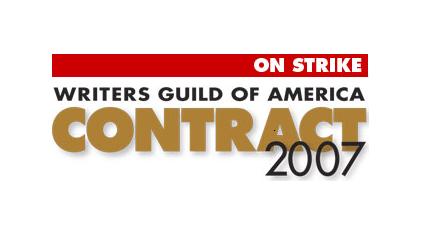Writers on Strike: Will the Upfront be Canceled?

Even with general acknowledgement that both sides of the Writers Guild of America strike are entrenched in non-negotiable positions, activists on both sides are publishing position papers and videos to generate public and industry support for their respective causes. The writers are way out in front on the propaganda and public posturing, generating support not only from their non-writing colleagues but most of the public that has taken the time to even form an opinion.
A video actively circulated on the web (see http://unitedhollywood.blogspot.com/2007/11/heartbreaking-voices-of-uncertainty.html) uses the words of Les Moonves, Sumner Redstone, Bob Iger and other senior network television executives against them. The commercial defines the overriding issue: networks and studios are raking in hundreds of millions each on digital assets while the writers make zero. While this point is not really an accurate representation of the facts, it is forging public opinion in favor of the writers and positioning network heads as the bad guys.
Vote at JackMyers.com: What Should Members of the Writers Guild Do?
The issues are complex, and while digital assets are driving revenues, that doesn't account for the losses the networks might absorb as audiences are lost to traditional media. Nor does it factor in the costs of digital distribution, which are not yet known, or the tremendous risk inherent in television development and production.
Apparently there has been some softening of positions on both sides and a recognition that if there is no resolution within the next three to four weeks, it's likely the strike will continue well into the summer and ultimately include the actors and directors, whose contracts expire in June 2008. At this point in the network television program development process, each major network is reviewing more than 1,000 concepts, narrowing them down to an average 100 that will be funded for script development during the first quarter. No writers, no scripts. In January the Television Critics Association meets in Los Angeles to hear network plans for the first half of the year and to get very early insights into fall season development plans. With writers striking, newspaper critics need to determine how they will personally and editorially approach coverage of the networks, and cable is likely to take center stage – if the TCA is not cancelled.
Once scripts are fully formed, networks give the green light for production of an average 25 pilots each. These pilots continue in production typically right up until the major network Upfront presentations in mid-May. At that point, the networks identify their most promising projects for presentation to advertisers, along with projected fall season schedules. On the basis of those presentations, media agencies estimate ratings for each program on each network and place their bets with $17 to $18 billion dollars of advance advertising commitments. Increasingly, these commitments incorporate digital assets.
If the strike continues into February and March, networks will be unable to provide advertisers with any meaningful program schedules, unless they exclude scripted series. This year's freshman series are unlikely to return intact, as even those that are marginal hits like Chuck will suffer severe audience attrition. No scripts, no pilots. No pilots, then all that's left of the Upfronts are the parties – and boy will the writers be out in force with picket signs at those events.
From there, it's a downward spiral for the networks. Once the Upfronts are cancelled – or become irrelevant – the 70 year old economic foundation of the television industry will be gone. The concept of a television season will be smashed. Broadcast and cable will be even closer to ratings parity. Broadband and mobile video delivery systems will have a chance to become even more solidly entrenched in the fabric of America's viewing patterns.
List Your Job Openings at Jobs at JackMyers.com, emPowered by mediabistro.com
If the strike continues into December, it's unlikely to be resolved until February or March at best. That's the very outside until the business models that have sustained studio, network and media agency economics implode from their own obsolescence. The reality is, as most in the industry accept already, the Upfront is an archaic vestige of outdated industry patterns and incestuous relationships. It won't be a disaster if the Upfront and these traditional models disappear or are radically altered. They will be replaced by more logical and ultimately more profitable models. Over the next two years, new set-top data will be available empowering the use of second-by-second ratings and measures of branded entertainment and product placement value. Media buyers and sellers will be better equipped to develop and implement integrated marketing, promotional and event programs.
Within these models, the value of digital assets will be more easily defined and the revenue sharing opportunities for all parties will be delineated. On the surface, it seems the networks and studios should give in and reach a deal with the writers in order to save the traditional Upfront models. Behind-the-scenes however, there is little incentive on the part of these companies to save economic models they already consider to be broken. It's a chance to rebuild the industry on the foundation of a new economic infrastructure, rather than breaking the existing model beyond saving.
So it comes down to whether the writers can hold out, which they will do, or whether the networks and studios ultimately believe the current system is worth saving. Bottom line, if you are planning your May schedule around Upfront Week, it might be a good time to plan a vacation.


